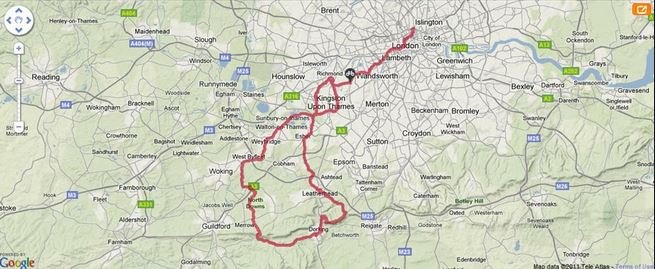
by Fern Shaw | May 20, 2013 | Charity
Radio Marsden is offering 50 cyclists the chance to ride part of the Olympic 2012 road race route.
They have organised the sponsored ride for Sunday, June 30th to raise funds for vital new studio equipment.
After more than 44 years of entertaining patients at the world-renowned Royal Marsden cancer hospitals in Sutton and Chelsea, the UK’s leading hospital radio station could be forced off-air if it doesn’t raise £50,000.
Now cycling enthusiasts can help reach that target by following in the tread of Sir Bradley Wiggins and pedalling 50 miles through the Surrey countryside, including the iconic climb up Box Hill.
“We have just 50 places to ride 50 miles and help us raise £50,000,” explained Radio Marsden Appeal Co-Ordinator Clive Davis. “It will be a circular route from the Royal Marsden Hospital in Sutton and has been designed to suit regular bike riders. It’s not a race and we want people to enjoy the challenge, admire the scenery and of course get sponsored for their effort.”
To be part of Radio Marsden’s inaugural sponsored cycle ride and to help keep them on-air, simply register and raise a minimum of £100. That commitment will help keep them on-air, delivering a mix of pre-recorded and live shows 24/7 to hospital patients, on-line at www.radiomarsden.co.uk and to a much wider community audience at outside broadcasts throughout Surrey and London.
As a registered charity they receive no financial support from the Royal Marsden Trust, the Government or the NHS, so please ‘get on your bike’ and support their latest fundraising initiative.
AquAid Surrey have ‘got on their bikes’ so to speak by paying for 50 cycling jerseys that will all bear the AquAid logo on the front.
AquAid – suppliers of a broad range of water coolers throughout the U.K. – is strongly linked to helping others to help themselves through supporting sustainable charity work through donations to charities such as Christian Aid and The Africa Trust.
We would like to wish Radio Marsden and the fab cyclists every success in this iconic cycle!
by Fern Shaw | May 3, 2013 | Charity, Health and Hydration
An Inconvenient Truth – Conspiracy or Reality?
In this world there is a surprisingly small amount of the population – just 19% according to a survey done by InternetWorldStats – that have access to the internet and to all the information it brings.
I really thought it would have been something closer in the region of 40% – colour me surprised!
Here I was thinking that when it comes to global environmental issues like ‘was An Inconvenient Truth made up purely for political grandstanding or is that really what we’re doing to the planet’, oodles of people had access to this and other such topical environmental issues. Not the case it would seem.
So, perhaps it’s best to forget about internet accessibility and reach and just resort to the physical world that we live in and good old common sense (boy, am I sounding like my elder elders round about now!). Hopefully, common sense is common sense globally and this is not affected by human wants and needs according to Maselow’s Law of Hierachy.
Common sense to me is to look around me at the world that I live in and map the changes with my beady eyes and act accordingly.
A prime example is the car trips the family took on our annual holiday to the seaside, when I was but a sprog. I rarely noticed anything on the initial trip, but it always struck me on the return. As said sprog, I vaguely remember that we would almost be back in the city, 17 miles out perhaps, before I would notice a little smog. Having been fortunate enough to have grown up in the countryside, anything other than a clear blue sky and fluffy white clouds was instantly noticeable.
Fast forward to adulthood, some 20 years on and I recreate that car trip down to the seaside. On the way back, a good 150 miles or so out of the city – still very much in the countryside, to be surrre – and I see a thick, heavy pall of smog, ugly as all get out with an awful yellow grey colour to it – lurking above the horizon. It shocked me – there is just no other word for it.
I know full well that there are a whole host of contributing factors, all very logical, but it did make me think that we have been rather blessed with a magnificent home, so best to do what I could to maintain and not abuse my home too much.
As a company, AquAid too, has a philosophy and ethic that strives to address the very challenging issue of climate change and to implement steps that will indisputably reduce our carbon emissions.
If, as suppliers and consumers, we all do the very best we can in this regard, then we may have some chance of halting the large-scale destruction of our planet in years to come. In this technology-based world, it is virtually impossible to become “truly” carbon neutral. However, we promise that at AquAid we are concentrating all our efforts and resources in minimising any damaging effects our business has on the environment, whilst continuing to balance this with our on-going commitment through Christian Aid and The Africa Trust of providing fresh clean drinking water for our world’s poorest and most deprived people.
By being kind to your planet, which is your home, you are actually being kind to yourself – pretty much a win-win situation if we look at it like that.
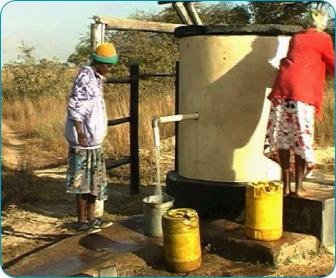
by Fern Shaw | Apr 8, 2013 | Charity, Water Coolers
The Elephant Pump – how does it work?
What is it?
The Elephant Pump is a manual activated water pump based on a 2000 year-old Chinese design that the CEO of The Africa Trust, Ian Thorpe, adapted, to make it stronger and more durable.
This award winning Pump brings a cost effective, reliable and sustainable solution to one of Africa’s biggest problems.
What does it do?
It is made and maintained using materials that are locally available in remote rural sub-Saharan African communities, which means that once the Pump has been built, local resources can be drawn upon for repairs and replacement parts.
It draws water up from a well at a high volume – approximately 1 litre per second. That means 60 litres per minute.
How does it work?
As the handle is turned, water is drawn up from a well of up to 30 meters in depth via a central pipe by washers attached to a rope. As the pump mechanism is fully enclosed to exclude sources of contamination, it yields a quality and quantity of water which exceeds WHO guidelines. The surplus water is used for livestock and irrigation of crops.
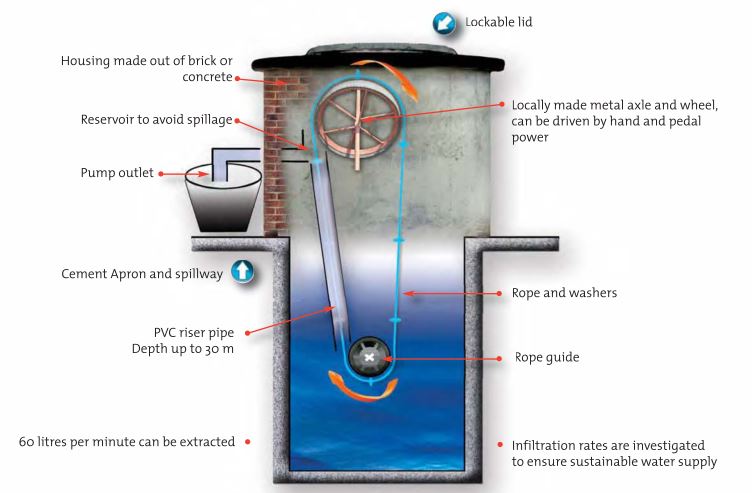
What are the benefits of the Pump?
The Elephant Pump has already contributed to bringing over 2 million people in rural Africa, a safe water source, at a price significantly less in comparison to comparable hand pumps.
- The ancient methods of constructing the Pump ensure the materials can be locally sourced and built, further promoting employment within the local community.
- Reliability – At any one time around 95% of existing Elephant Pumps are in operation which is 40% above the average for Africa.
- Ease of Use – The Elephant Pump is safe and suitable for operation by children and the elderly.
- High Volume – The Pump can provide 500 people with 20 litres per person, per day for domestic use.
- The money saved from installing an Elephant Pump provides enough money to build an additional pump providing a further 500 people with water.
Where does AquAid fit in?
At AquAid, we continually strive to supply water coolers that are best suited to our customers’ requirements thereby ensuring that our customers keep hydrated. At the same time, our water coolers also help provide safe drinking water to thousands of people every year by donating to sustainable charities; the Elephant Pumps in particular, being built as a direct result of monies donated to The Africa Trust.
How do you fit in?
For each purchase of an AquAid water cooler, a portion of that revenue is donated to Christian Aid and The Africa Trust.
We also have on-going paperless campaigns where selected customers are offered the opportunity to have an Elephant Pump with their name on it, built in a rural community, thereby ensuring a safe water supply to others less fortunate.
So when you use our services you are also benefiting many others in the developing world and helping to save lives.
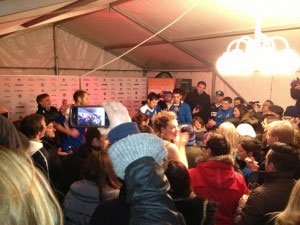
by Fern Shaw | Mar 26, 2013 | Charity, Health and Hydration
There are seven billion people on this planet and only one has run 521 miles on a treadmill in a week!
AITC’s Dan Lawson broke Sharon Gayter’s incredible record in the early hours of this morning, surrounded by well-wishers and supporters including Albion in the Community’s Dick Knight, Alan Sanders and Michael Edwards, plus Albion’s chief executive Paul Barber, who ran for an hour with Dan earlier in the evening alongside club chairman Tony Bloom.
In an electric atmosphere, Dan’s seven-day mission came to a climatic end amid raucous cheers, and quite a few tears, at 12.20am. Running over three marathons a day, the 40-year-old from Hove tested his mental and physical strength to the absolute limit battling through severe stomach pain, sleep deprivation, and creaking joints to break a world record that may never be eclipsed.
Buoyed throughout the final day by his favourite music from the early 1990s and unstinting support from his colleague Stuart Christie, friends Charlotte Jalley and Lewis Pilgrim, and his two daughters Lilly and Ruby, Dan also managed to conduct three TV interviews – two live – and four on the radio!
Dan’s stunning achievement was to raise funds and awareness for AITC’s children’s activity projects, designed to keep their youngsters healthy and active.
Sponsor Dan: here.
All of us here at AquAid and specifically those at AquAid West Sussex, who sponsored Dan’s Water Coolers and drinking water, would like to say congratulations to Dan on an absolutely phenomenal achievement!
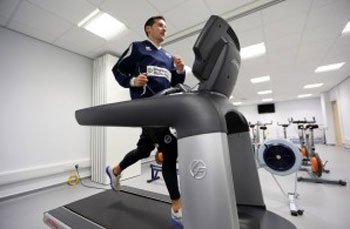
by Fern Shaw | Mar 14, 2013 | Charity, Health and Hydration
Albion in the Community (AITC) is Brighton & Hove Albion Football Club’s innovative, multi award-winning and independent charity.
AITC use the power of football and the reach of Brighton & Hove Albion to deliver projects in the areas of health, education, disability and social inclusion all underpinned by our core themes – increasing participation, creating opportunities, tackling inequalities and improving health. In 2011 alone, they directly benefited 47,821 people through their work.
This March, the excitement builds, as Dan’s Dare looms large on the horizon.
What is Dan’s Dare you may ask? Dan is hoping to beat the greatest distance run in a week on a treadmill to raise money for Albion in the Community.
This Saturday, 16 March, the 40 year old Dan Lawson will commence his world-record attempt outside the Jubilee Library in the centre of Brighton. The current record stands at 520 miles and to surpass it he will have to run the equivalent of 20 marathons, nearly three a day. There will be little time for sleep and recovery as Dan is expected to run non-stop for around 14 hours a day.
Companies can register to secure a day of 10 one-hour slots for employees to run alongside Dan. Each runner will need to raise a minimum of £100. If your company would like to support Dan, please contact Bob Beaken at: Bob.Beaken@albioninthecommunity.org.uk
Should you wish to Sponsor Dan you can do so by clicking here You can also get in touch and find out more by following Dan on Twitter @therunningdan.
AquAid West Sussex is so impressed with Dan’s Dare that they’re supplying all the drinking water for his mind boggling attempt at beating the current record.
At AquAid, in case you weren’t aware, we’re all about, well, water – fresh, from the source, bottled water that we supply to customers throughout the U.K. More than this though, a very important part of AquAid’s work ethos is to also ensure that those in desperate need in Third World countries have access to clean drinking water too.
Go Dan, go! We’re really rooting for you and your effort.
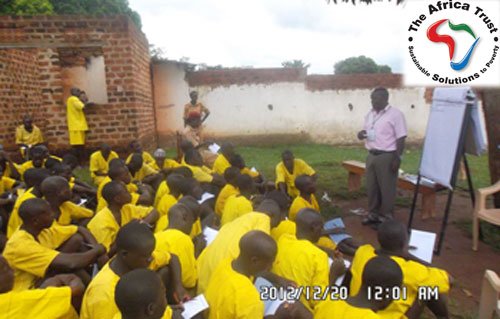
by Fern Shaw | Mar 14, 2013 | Charity
Overview
With funding from AquAid, the Africa Trust has gone through a period of remarkable growth during the last twelve months. The pump installation and sanitation program has been expanded within Zimbabwe and over the eastern border into Mozambique. Groundwork has also been completed for a new pump installation program to start in Liberia later this year. There has been an expansion of the water pipeline program in Tanzania and seed loans have been provided for dozens of small income generating projects to be established. These include over forty small businesses in Malawi and Kenya and an extension of the dairy cattle project in Zimbabwe along with the banana-growing project, which is paying school fees for over 500 orphans and vulnerable children. Thousands of people received business skills training from the Africa Trust during the last year and village savings and loans associations were established in Uganda and Tanzania to help people save and lend money within a tightly bonded group, thereby avoiding punitive interest rates. The core ethos of sustainability has been built into all the new projects with loans, rather than grants being issued to help start up new businesses and with income generating projects such as motorbike taxis being established to create employment and to bring in additional income for the Africa Trust.
In total over 110,000 new beneficiaries were reached in the last year.
Country Programs – Zimbabwe
The core program of pump building in Zimbabwe has grown with 432 Elephant Pumps installed in 2012 compared to 367 in 2011. Maintenance and repair costs have risen slightly, as staff attempt to reach more of the existing five thousand plus pumps and address maintenance problems that they encounter. This is now a massive program with Elephant Pumps, managed by the Africa Trust, providing clean water for over 10% of the entire population of Zimbabwe. In addition to the core staff, it has been possible to provide contract work to over 40 other individuals (mainly former employees of Pump Aid) during the course of the year.
Sanitation work continues to expand, with 162 new Elephant Toilets installed during 2012. The aim has been to assist in one community in an attempt to completely eradicate open defecation. Installation of toilets is combined with education in a community led total sanitation approach. If funding can be secured, this pilot program needs to be expanded massively as the sanitation infrastructure in Zimbabwe and other countries is totally inadequate. Many of the rural schools in Zimbabwe lack decent sanitation, as do the rural communities. This is the major reason why Zimbabwe has recorded some of the worst outbreaks of cholera in Africa along with a high incidence of other waterborne diseases.
Over 500 students continue to benefit from the banana growing project for schools with an additional 24 students added during the year. Some extra costs were incurred due to damage to fences, but there was a second successful harvest and this project continues to deliver a sustainable solution allowing the most vulnerable children to remain in school. Two separate banana plantations were established along with a banana seedling nursery project, which will generate significant income for the Africa Trust in Zimbabwe especially at harvest, towards the end of this year. A pool table rental project was established and has grown to provide funding for work in the prisons. Purchase of maize proved popular as the Africa Trust offered farmers a better price than they would have otherwise achieved. The stored grain has appreciated in value, but instead of selling it over the next month or two it is being used to provide emergency food relief to avert starvation where this was a real threat. The dairy cattle project has been extended in the eastern highlands.
Uganda
In Uganda there was a significant investment in business skills training in 2012, which has helped to establish a large program. Over 3,000 people were trained and a significant proportion of these went on to establish successful businesses. An independent survey produced encouraging feedback on the impact of this program. They found that more than a third of the people trained went on to start their own business. There is however much less poverty in Uganda compared to other countries where we are operating. For this reason, the budget for Uganda will be reduced by more than 50% in 2013, as more of the available funding is allocated to promote new businesses in countries such as Malawi. The leader of the Uganda program has been encouraged to seek funding from other sources to continue growing the operation. He recently went on a fundraising visit to the States and has been looking into securing local contracts for business skills training.
Here are his comments from one training course:
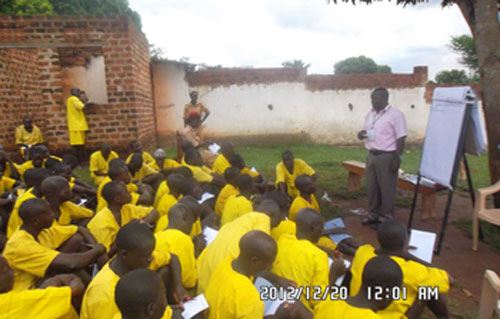
“I am doing an unusual business training class for more than 60 prisoners inside a prison today. There are only 3 ladies among them. They have appreciated the training and they say they see a pathway of earning a legitimate and decent living after they are released from custody. We specifically asked for those who will be released in the next three months.
Today, as I was about to begin the days class I heard gunfire outside the prison fence, one of the prisoners was trying to escape (good or bad, he was not one of my class). The prison guards gave a chase and the whole prison went on a lock down for two hours. I felt as if I was also a prisoner. The escaping prisoner was nabbed after a long chase, brought back to the prison and heavily punished. The class was given a go ahead to continue, because the prison authorities believe its critical and complements their work well and could potentially reduce the re-offending rate.” Livingstone Mukasa
Malawi
In Malawi, a business skills training program has been established using Namisu Orphanage as a base. Malawi is much poorer than Uganda so it is necessary to provide loans for people to start businesses in addition to providing training. With the employment of one member of staff to run this program, it is hoped that there will be an improved success rate although we are still willing to take risks and some individuals will fail to repay their loans. The aim is to develop a small but growing revolving fund, which will assist hundreds of individuals to establish their own businesses. Joshua Searle has taken on responsibility for line-managing our man on the ground and he is helping to identify individuals who should receive funding for their business proposals. I have also asked Josh to identify and quantify income generation opportunities in Malawi.
Tanzania
We have an excellent project manager in Tanzania who has successfully established and manages two extensive gravity-fed water pipelines after I did the initial survey and mapping work. He has also provided input for a third pipeline, which is being installed in collaboration with Dorcas Aid. He has been successful in mobilizing entire communities to assist in the digging of trenches and has also established a couple of village level savings and loans associations. These associations allow people to save and borrow in groups rather than being subject to loan sharks who often charge in excess of 20% a month. Johnston has also established and now manages a motorbike taxi business, which is described below.
Kenya
Following business skills training, a group of individuals, mainly pastors, has been assisted with loans to start various businesses. Bishop Sammy is providing monthly updates. He has achieved a very low default rate with loan repayments. He has also identified three pastors who are currently renting bikes on a trial basis to raise funds for the Africa Trust.
Mozambique
A pump building program has been seeded in Mozambique in partnership with Dorcas Aid International. The plan is to run this pilot program with a small number of pumps for a year so that the government can grant formal approval for the technology. With this approval, it will then be possible to expand the program across the country. Mozambique has a border with Zimbabwe, so it was a logical choice for expansion. In addition to pump building, there are also plans to do business skills training and sanitation work (also in collaboration with Dorcas Aid).
South Africa
In the eastern cape, which is the poorest province of South Africa, a couple of small projects are being established to raise income for the Africa Trust. A barber and hair-dressing salon has been established which employs four people and is expected to pay for itself within 14 months. Thereafter the salon is expected to produce profit, which will cover the costs of our project manager while continuing to provide employment. Khanyi is exploring a number of interesting business opportunities including a tuk tuk taxi business and the manufacture of toilet paper.
Liberia
Preparatory groundwork was completed for the launch of a new country program in Liberia by the middle of 2013. The departure of Pump Aid at the end of 2012 provided an opportunity to purchase much of the equipment needed to establish a pump and toilet building program. I was able to meet with all the former Pump Aid staff in Liberia and all are keen to secure employment with the Africa Trust once operations commence. We have an opportunity to help former child soldiers put their past behind them and focus on gainful employment, which also helps the community.
I met with the Vice-President of Liberia and with all the relevant ministers to discuss possibilities for the Africa Trust to assist in that country. It is clear that the government is keen for us to expand the Elephant Pump and Elephant Toilet programs which I set up when working for Pump Aid.
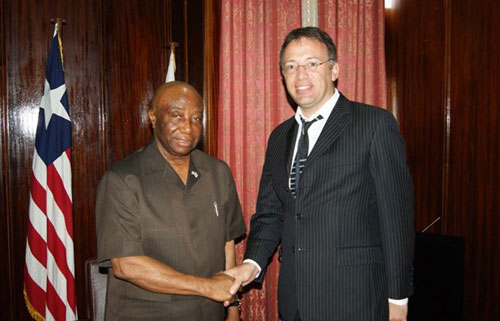
I also see great potential for household water filtering using locally made ceramic filters, which I have designed to filter water that is harvested from tin roofing sheets. It rains a lot in Liberia, and the main issue is quality of water. The ceramic filters are made in the same way as ordinary clay pots except that fine powder sawdust is mixed with the wet clay to produce the fine porosity that filters out cysts, sediment and even bacteria. Colloidal silver is painted on the inside of the pot to destroy viruses and inhibit algal growth. A storage tank is needed with closed guttering running into it. Clean filtered water can be sold or used.
Liberia is a country where you meet people in the most desperate situations everywhere you go. A huge number of people had both their hands cut off during the horrendous civil war and it is hard to comprehend how they have survived. Apart from individuals who have been physically maimed, the majority of the population has been psychologically damaged by the atrocities they experienced or witnessed. The emergency relief fund allowed for some of the people I met to receive small, but life saving amounts of money to help them have some hope of surviving. Along with prisoners in Zimbabwe, who also benefit from the emergency relief fund, I have never witnessed people in such desperate situations anywhere else in my 25 years working in 32 countries across Africa.
We have started helping former child soldiers to tell their stories from the war including one girl who taken to be a soldier at the age of seven. She was raped repeatedly and forced to shoot her own step-mother and was then drugged and indoctrinated into committing atrocities. Another boy aged eight, was wrapped in barbed wire and left to die at the mercy of black biting ants in a pit filled with human body parts because he refused to kill his friend. Hundreds were raped and tortured including one boy who was forced to drink battery acid, which caused terrible internal damage. I feel very strongly that people who have been through such terrible experiences deserve a chance to create new lives for themselves. We look forward to employing a number of former child soldiers and to assisting others to start small businesses such as riding motorbike taxis.
The Motorbike Taxi Business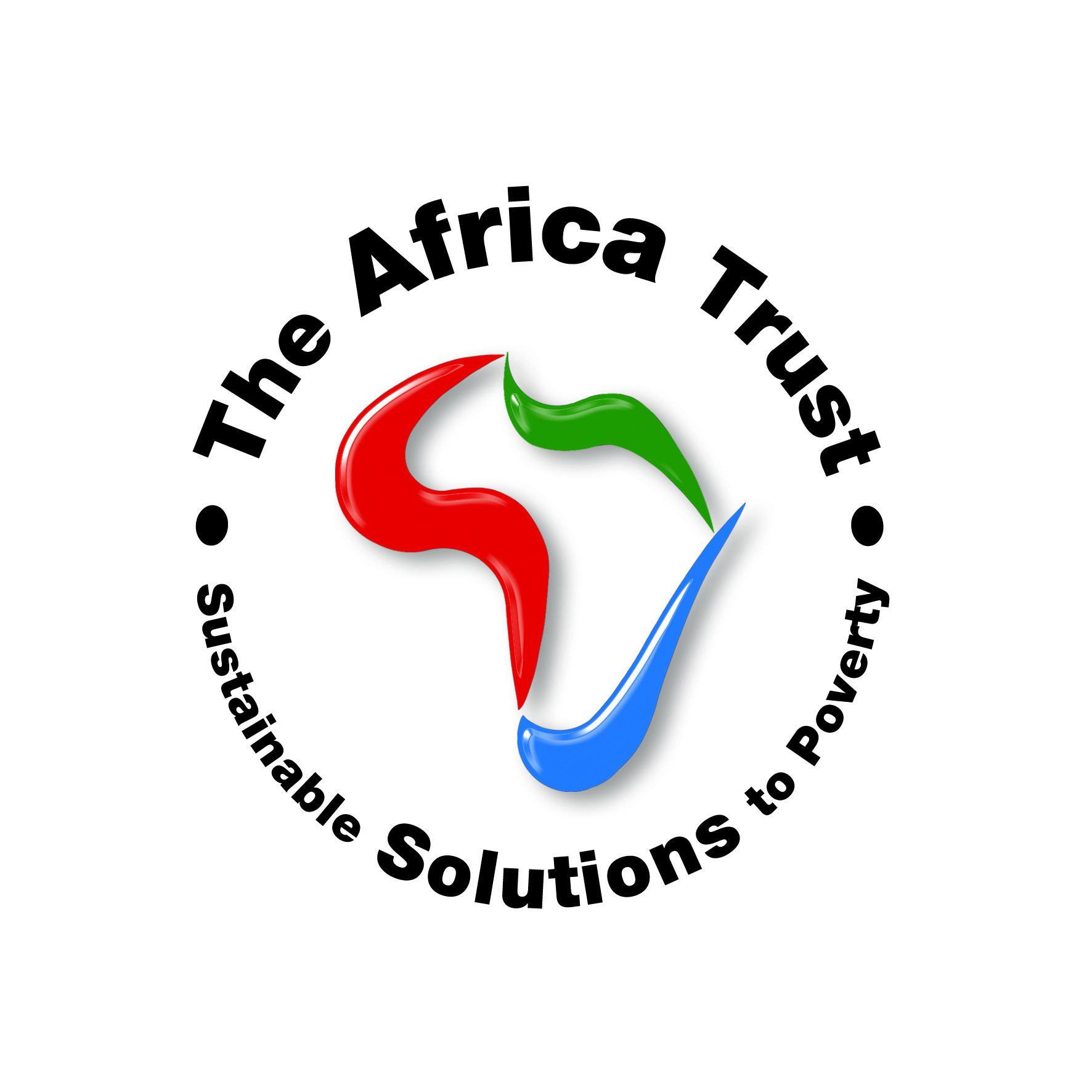
We have commenced a motorbike taxi business to raise funds for the Africa Trust in three countries and will shortly be starting in a fourth. This is effectively a rental business whereby the rider pays a daily rate, which we typically set at around 20% lower than the market rate that riders normally pay. This provides a good income to the rider, which is higher than other riders who are renting on the open market. Through this business, we are providing employment to carefully selected individuals. The bikes cost around a thousand dollars to buy new, depending on the model and a further two or three hundred dollars is spent on the initial registration, training, safety clothing and licensing. We expect each bike to operate for four years.
Net income in Kenya (after allowing for oil changes and minor repairs) is $3.3 per day for 300 days a year = $990 per year per bike. It will take 15 months to recover the cost of the bike and then the next 33 months will yield profit of around $2,000 (allowing for repairs and annual licensing). The bike will then be given to the rider when it has been in use for four years. In Tanzania, a slightly higher return of $3.5 per day for 300 days a year is possible, and in Liberia the daily income is significantly higher at $4,8 a day. This means that the cost of the bike is recovered in 11 months and the next 37 months will yield profit of around $3,500. We currently have two bikes operating in Liberia, three in Kenya and five in Tanzania.
Liberia is a more risky country with regards to theft and security, but each bike allows one former child soldier to have an income, which can support their family. In Kenya, the riders selected so far are all pastors, who are able to combine this work six days a week along with their ministry. In Tanzania, we have carefully selected reliable individuals to ride the bikes and Johnston, who is overseeing the program, is very competent and trustworthy. In Kenya and Tanzania riders can send their daily or weekly rental by mobile phone, but in Liberia, the rider brings their weekly rental to a central location as cash.
In the eastern cape of South Africa (the poorest province in the country) we are starting a three-wheel tuk tuk taxi business since motorbike taxis are not allowed. The first tuk tuk will arrive next week from China and is expected to provide an average daily income of around $12 for 300 days a year which would mean that the cost is recovered in around one year and thereafter it is hoped that there will be a further three years of profitable usage, raising funds for the Africa Trust. We do however still need to get actual figures from the first tuk tuk before we can make more confident and informed projections. In Malawi, bicycles are commonly used as taxis, and we are keen to get into the bicycle rental business. We are yet to have reliable figures for this business, but it may well have significant potential to generate profit while providing employment. We are considering providing some prisoners with bicycles as they are released (after they have undergone business skills training in prison prior to their release). This should help to reduce the rate of re-offending.
Summary
In summary, AquAid funding over the last year has enabled the Africa Trust to expand its core program of establishing sustainable supplies of clean water across Africa. In addition, it has been possible to increase the diversity and number of projects in new regions and countries. Each AquAid water-cooler is making a difference and helping to provide sustainable solutions to poverty in Africa.
Thank you for your support.
Ian Thorpe
Chief Executive
The Africa Trust.









